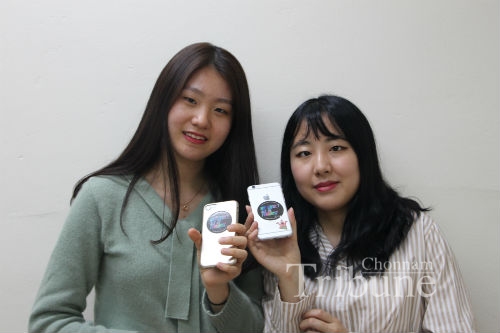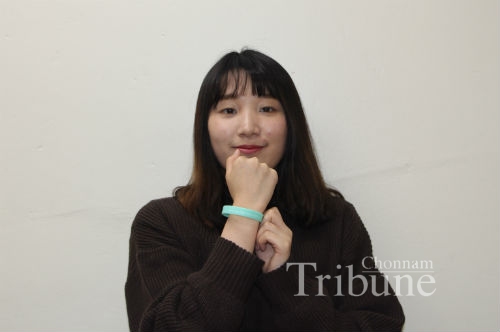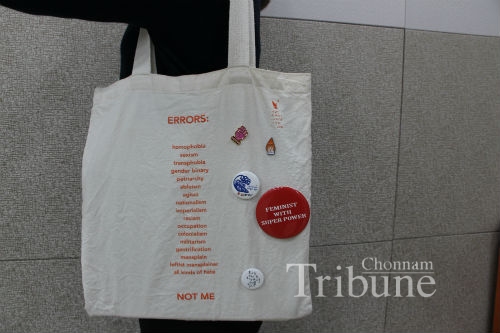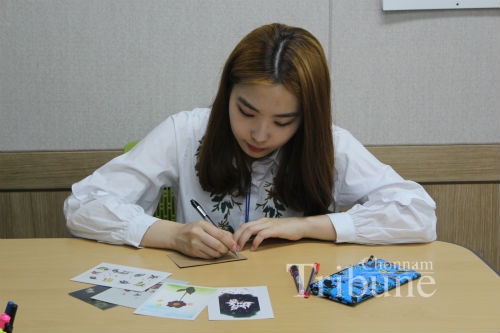Many students are walking in the streets on campus holding tumblers in their hands. Inside their tumblers, there is fair trade coffee. Turning around, we can see other students who have badges or phone cases with letterings like “Empathy for Life.” Like the interesting scenery depicted above, nowadays, many people buy and carry special items that express their personal ideas and opinions about social issues. This consumer taste and consumption behavior is called “meaning out” as a consumption trend in Korea. The consumption trend is hugely popular among young people. The Chonnam Tribune will report some ways for students to get involved in the meaning out trend as well as the social implication of such consumer behavior and consumption trends.

Changes in Consumer Behavior
Today’s consumers purchase products and services to express their thoughts and ideas, then share their opinions about social and political issues and how to make a better society, using the Internet and social media. Experts said that digital technology allows consumers to change their behavior more actively and diversely than in the past. This kind of consumption is called “meaning out”, which is a newly coined phrase that appeared in the book “Trend Korea 2018” for the first time. It is currently known as one of main consumption trends in Korea. Professor Hong Eun-sil (Dept. of Family Environment and Welfare) explained that modern consumers have a tendency to consume more actively and to express and share their opinions using IT technology. “Consumers in the past pursued their basic desires, but consumers at present purchase products to express their thoughts and feelings beyond their basic needs in a variety of ways. In that sense, meaning out is not a new consumption trend. It is standing out as a recent consumption trend by a series of trend experts,” she said.
In the current advanced media environment, people, especially young generations, nowadays obtain information about products that have gone viral through social networking sites nationwide and worldwide. They also can be easily self-expressed through gender, identity and sexuality, and voice their opinions on issues in various ways like using hashtag. Furthermore, they tend to consume based on their own beliefs and values. College students are no exception. They use hashtags to post their opinions on their social media accounts, to carry specific things, or to boycott some particular brands. It means that many people do not hesitate to show their thoughts, taste and even emotion through consumption. In that sense, meaning out is not just a consumption trend, but it is more like a consumer movement to make a better society.

Consuming Based on One’s Own Values
The number of consumers who purchase products based on their own values is increasing. Even if students do not know the terms, ‘meaning out’ as it is a newly coined word, many of them are already participating in the consumption trend. They buy products that express the same messages as their ideas or aspirations about particular issues. Recently many brands are developing and marketing products with slogans or signs related to some issues. Lifestyle brand Marymond makes products related to the victims of sexual slavery by the Japanese military and donates the profit from the sale of which would be automatically contributed to them. Students buy the brand’s products such as eco bags and phone cases because of their good designs and the brand’s good intention. In addition, many students have badges about social issues including the #MeToo movement, feminism and saving animals. They voice their opinions about the social issues by attaching badges on their bags or clothes. By doing this, they know others’ thoughts about the issues and share their opinions. Attaching badges with #WithYou, #MeToo on their belongings can show their support and solidarity.
Consumers, meanwhile, boycott or buycott (the opposite of boycott) some brands or products due to specific reasons. For example, people boycott brands that discriminate against their employees because of gender. They want to tell us that gender discrimination is not desirable by not buying products from these brands. People who disagree with animal testing only use cosmetic brands that do not conduct animal experiments. Jang Jun-a (Sophomore, Dept. of Education) is now boycotting a cosmetic brand which selected a celebrity who said misogynistic words as their model. “The brand also marked the East Sea as the Sea of Japan on their website. I think we need to boycott these brands so that we can deliver our opinion and change people’s minds,” she said. There are also vegetarians who do not eat meat to save animals and some parents use only organic ingredients when they cook for their children because organic farmers do not use many pesticides or chemicals.

Shift from Consumers to Prosumers
As IT technology is changing people and their daily lives, some of them are moving from consumers with buying power to prosumers. ‘Prosumer’ is a compound word made up of ‘producer’ and ‘consumer’ or ‘professional’ and ‘consumer’. Marketing experts said that as the term prosumer also has a meaning “product and brand advocate”, people are influencing the success or failure of products and brands as important market players, not as simply consumers. Unlike mass production in the past, the advancement of technology and consumers’ change have led to a high-variety and low-volume production system. As a result, the power of consumers has been increasing in the markets.
Moreover, people create their own products and services and sell them using their own social media such as Twitter and Facebook pages. Others support them on crowdfunding platforms including Tumblbug and Wadiz or buy their products. Crowdfunding is a practice to fund a project or a campaign by raising a small amount of money from many individuals together, usually on the Internet. Crowdfunding platforms are helpful for individuals to create commodities using their own ideas and creativities. Their future customers can financially support them and deliver customers’ opinions more directly to them. Now many people do not simply consume products but affect the markets through sharing opinions with each other on social networks. Students do the same. They do not pursue only the designs and qualities of products but also express their beliefs or tastes by using crowdfunding sites like Tumblbug, a popular website that encourages these kinds of consumer activities. Han Yeong-ju (Senior, Dept. of Korean Language and Literature) said she often used Tumblbug to do the meaning out activity. “I have many stickers and badges about social issues including ‘#MeToo movement’ and environmental issues. There are many other kinds of products made by personal manufacturers such eco bags, notes, and books. People tend to participate in crowdfunding the projects they support. I think it is nice to share ideas with other people and support each other,” she added.

The Trend Shaping the Future of Society
By participating in the meaning out activity, people can express their ideas and opinions freely. This kind of consumer movement can bring a better society to us. However, if consumers are misinformed about important but unproved political and social issues, they may give a bad influence to our society. Yoon So-young (Junior, Dept. of Philosophy) said, “It would be hard to prove all consumers’ opinions. If there are too many different opinions about particular issues, society may become really confused.” It means irresponsible meaning out activities can cause conflicts between people and intensify prejudice to each other.
Despite these worries about the meaning out trend, students interviewed by the Tribune report have a good impression about it. As it has become more widespread and influential among people, if they pursue with good intentions when purchasing products, it will be one step closer to making a better society. However, we need to think that each product has its own meaning, thus, before we buy anything, we should consider how our consumption behavior like the meaning out activities impact our society. Our consumption has much more value and power than expected. When we realize our small action is meaningful and can change the future of society. When we become more active and thoughtful consumers, our society will be a better place.
By Cha Jang-won, Student Editor

